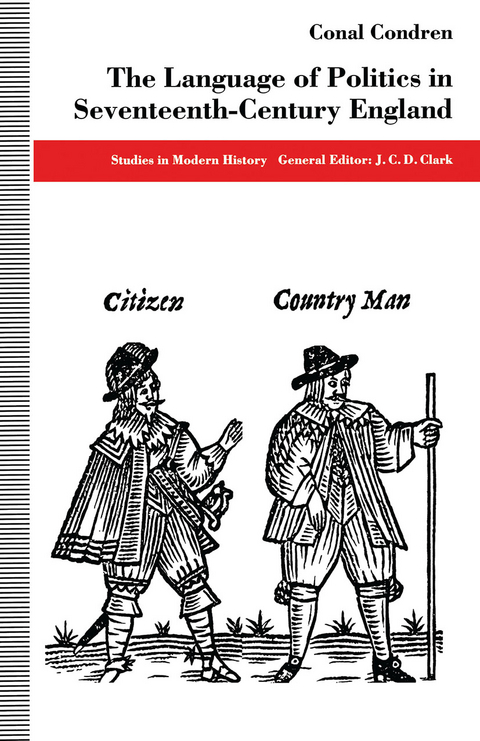
The Language of Politics in Seventeenth-Century England
Seiten
1994
|
1st ed. 1994
Palgrave Macmillan (Verlag)
978-1-349-23568-1 (ISBN)
Palgrave Macmillan (Verlag)
978-1-349-23568-1 (ISBN)
This is a study of the words of political discourse in seventeenth-century England from which we now reconstruct its theories. Part 1 presents an overview of the political domain in the seventeenth century arguing that what we see as the political was fugitive and subject to reductionist pressures from better established fields of discourse.
This is a study of the words of political discourse in seventeenth-century England from which we now reconstruct its theories. Taking its starting point in modern theories of language,intellectual history is first reconceptualised. Part 1 presents an overview of the political domain in the seventeenth century arguing that what we see as the political was fugitive and subject to reductionist pressures from better established fields of discourse. Further, there were strong pressures leading towards an indiscriminate and relatively general vocabulary, in turn facilitating the imposition of our anachronistic images of political theory. Part 2 focuses on a sub-set of the political vocabulary, charting the changing relationships between the words subject, citizen, resistance, rebellion, the coinage of rhetorical exchange. The final chapter returns most explicitly to the themes of the introduction, by exploring how the historians own vocabulary can be systematically misleading when taken into the context of seventeenth-century word use.
This is a study of the words of political discourse in seventeenth-century England from which we now reconstruct its theories. Taking its starting point in modern theories of language,intellectual history is first reconceptualised. Part 1 presents an overview of the political domain in the seventeenth century arguing that what we see as the political was fugitive and subject to reductionist pressures from better established fields of discourse. Further, there were strong pressures leading towards an indiscriminate and relatively general vocabulary, in turn facilitating the imposition of our anachronistic images of political theory. Part 2 focuses on a sub-set of the political vocabulary, charting the changing relationships between the words subject, citizen, resistance, rebellion, the coinage of rhetorical exchange. The final chapter returns most explicitly to the themes of the introduction, by exploring how the historians own vocabulary can be systematically misleading when taken into the context of seventeenth-century word use.
Preface - Introduction - PART 1: OVERVIEW OF THE POLITICAL DOMAIN - Stability and Structure - Conflation and Distinction - PART 2: THE VOCABULARY OF STATUS AND ACTION - Subject and Citizen - Rebellion and Resistance - Will all the Radicals please lie down, we can't see the seventeenth century - Notes - Index
| Erscheinungsdatum | 04.02.2016 |
|---|---|
| Reihe/Serie | Studies in Modern History |
| Zusatzinfo | XI, 215 p. |
| Verlagsort | Basingstoke |
| Sprache | englisch |
| Maße | 140 x 216 mm |
| Themenwelt | Geisteswissenschaften ► Geschichte ► Regional- / Ländergeschichte |
| Geisteswissenschaften ► Philosophie ► Sprachphilosophie | |
| Sozialwissenschaften ► Politik / Verwaltung ► Politische Theorie | |
| ISBN-10 | 1-349-23568-7 / 1349235687 |
| ISBN-13 | 978-1-349-23568-1 / 9781349235681 |
| Zustand | Neuware |
| Haben Sie eine Frage zum Produkt? |
Mehr entdecken
aus dem Bereich
aus dem Bereich
Erinnerungen
Buch | Softcover (2024)
Pantheon (Verlag)
CHF 22,40


